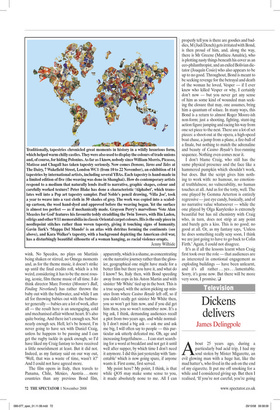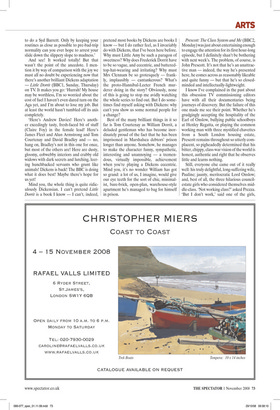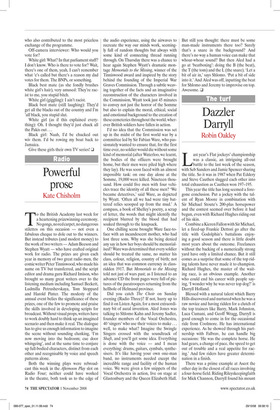Dickens delivers
James Delingpole
About 25 years ago, during a particularly bad acid trip, I had my soul stolen by Mister Migarette, an evil glowing man with a huge hat, like the mad hatter’s, who lived in the ash on the end of my cigarette. It put me off smoking for a while and I considered giving up. But then I realised, ‘If you’re not careful, you’re going to do a Syd Barrett. Only by keeping your routines as close as possible to pre-bad-trip normality can you ever hope to arrest your slide down the slippery slope to madness.’ And see! It worked totally! But that wasn’t the point of the anecdote. I mention it by way of comparison with the joy we must all no doubt be experiencing now that there’s another brilliant Dickens adaptation — Little Dorrit (BBC1, Sunday, Thursday) on TV. It makes you go: ‘Hurrah! My house may be worthless, I’m so worried about the cost of fuel I haven’t even dared turn on the Aga yet, and I’m about to lose my job. But at least the world hasn’t tumbled off its axis completely.
‘Here’s Andrew Davies! Here’s another excedingly tasty, fresh-faced bit of stuff (Claire Foy) in the female lead! Here’s James Fleet and Alun Armstrong and Tom Courtenay and David Bradley and — no, hang on, Bradley’s not in this one for once, but most of the others are! Here are dusty, gloomy, cobwebby interiors and crabby old widows with dark secrets and lurching, leering hunchbacked servants who grunt like animals! Dickens is back! The BBC is doing what it does best! Maybe there’s hope for us yet!
Mind you, the whole thing is quite ridiculously Dickensian. I can’t pretend Little Dorrit is a book I know — I can’t, indeed, pretend most books by Dickens are books I know — but I do rather feel, as I invariably do with Dickens, that I’ve been here before. Why must Little Amy be such a paragon of sweetness? Why does Frederick Dorrit have to be so vague, and eccentric, and batteredtop-hat-wearing and irritating? Why must Mrs Clennam be so grotesquely — frankly, implausibly — cantankerous? What’s the proto-Hannibal-Lecter French murderer doing in the story? Obviously, none of this is going to stop me avidly watching the whole series to find out. But I do sometimes find myself asking with Dickens: why can’t you show us some normal people for a change?
Best of the many brilliant things in it so far is Tom Courtenay as William Dorrit, a deluded gentleman who has become inordinately proud of the fact that he has been imprisoned in Marshalsea debtors’ prison longer than anyone. Somehow, he manages to make the character funny, sympathetic, interesting and unannoying — a tremendous, virtually impossible, achievement when you’re playing a Dickens eccentric. Mind you, it’s no wonder William has got so grand: a lot of us, I imagine, would give our eye teeth for the sort of chic, minimalist, bare-brick, open-plan, warehouse-style apartment he’s managed to bag for himself in prison. Prescott: The Class System and Me (BBC2, Monday) was just about entertaining enough to engage the attention for its first hour-long episode, but I definitely shan’t be bothering with next week’s. The problem, of course, is John Prescott. It’s not that he’s an unattractive man — indeed, the way he’s presented here, he comes across as reasonably likeable and quite funny — but that he’s so closedminded and intellectually-lightweight.
I know I’ve complained in the past about this obsession TV commissioning editors have with all their documentaries being journeys of discovery. But the failure of this one made me see their point. Whether he’s grudgingly accepting the hospitality of the Earl of Onslow, bullying public schoolboys at Henley Regatta, or playing the common working man with three mystified chavettes from a South London housing estate, Prescott remains throughout so utterly complacent, so pigheadedly determined that his bitter, chippy, class-war vision of the world is honest, authentic and right that he observes little and learns nothing.
Still, everyone else came out of it really well: his truly delightful, long-suffering wife, Pauline; jaunty, meritocratic Lord Onslow; and, best of all, the three hilarious councilestate girls who considered themselves middle-class. ‘Not working class?’ asked Prezza. ‘But I don’t work,’ said one of the girls, who also contributed to the most priceless exchange of the programme.
Off-camera interviewer: Who would you vote for?
White girl: What? In that parliament stuff? I don’t know. Who is there to vote for? Wait, there’s one of them, yeah, I can’t remember what ’e’s called but there’s a reason my dad votes for them. The BNPs, or something.
Black best mate (as she fondly brushes white girl’s hair), very amused: They’re racist to me, you stupid bitch.
White girl (giggling): I ain’t racist.
Black best mate (still laughing): They’d get all the blacks out of the country and I’m ’alf black, you stupid slut.
White girl (as if this explained everything): Oh. I thought they’d just chuck all the Pakis out ...
Black girl: Naah, I’d be chucked out wiv them. I’d be rowing my boat back to Jamaica.
Give these girls their own TV series! ❑




































































































 Previous page
Previous page